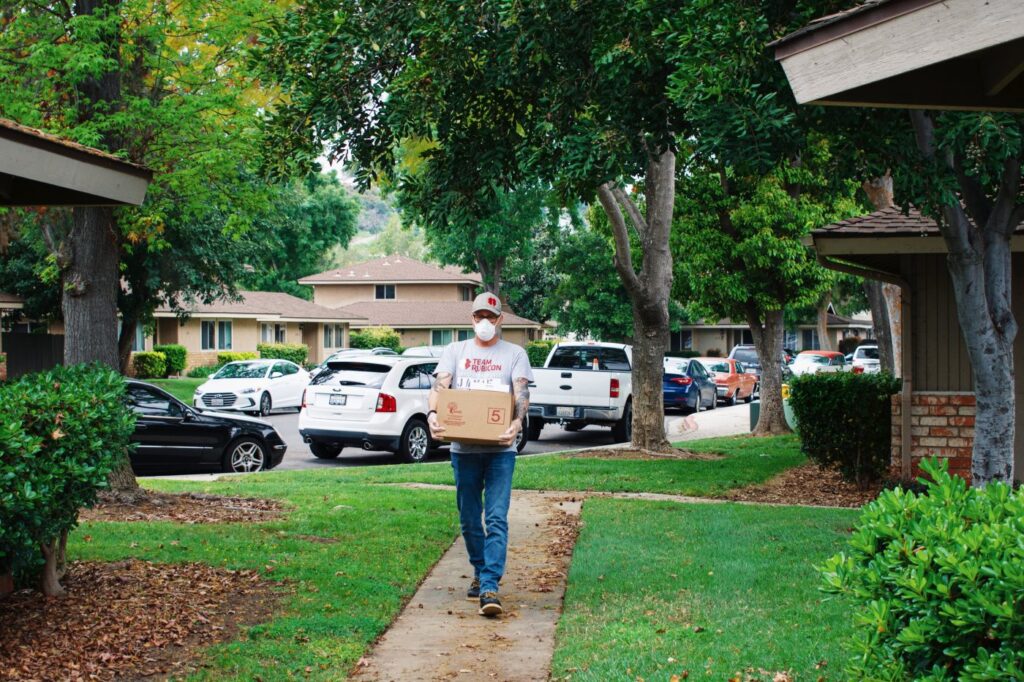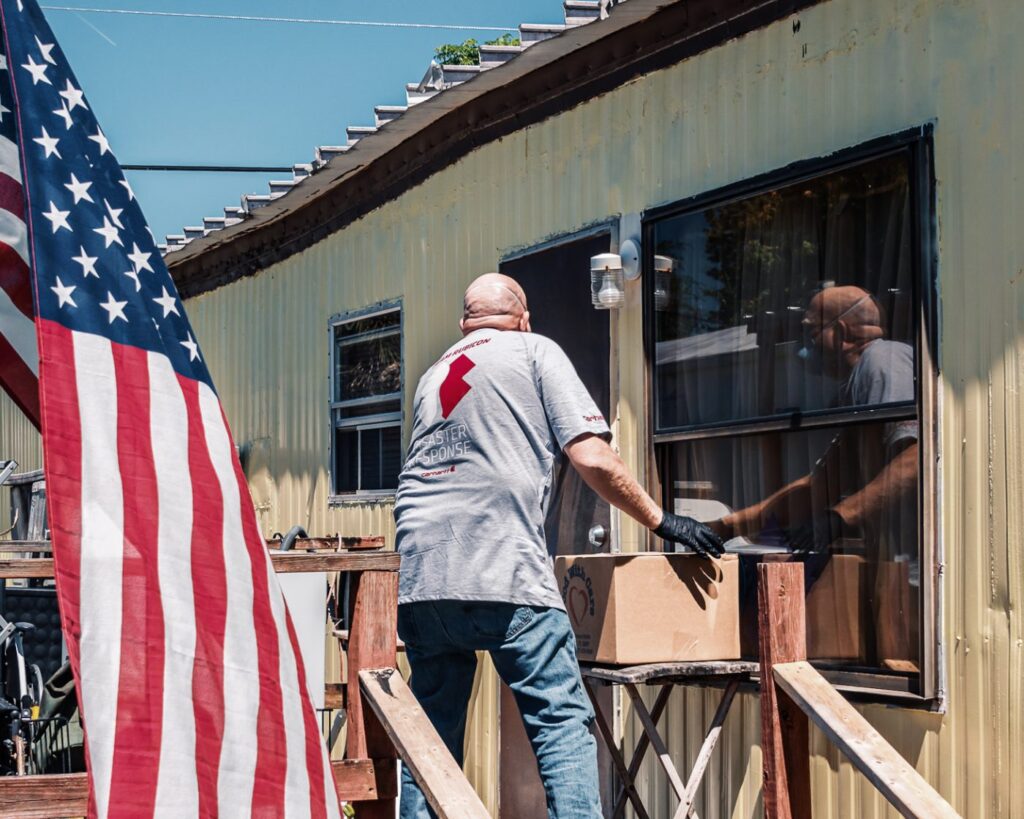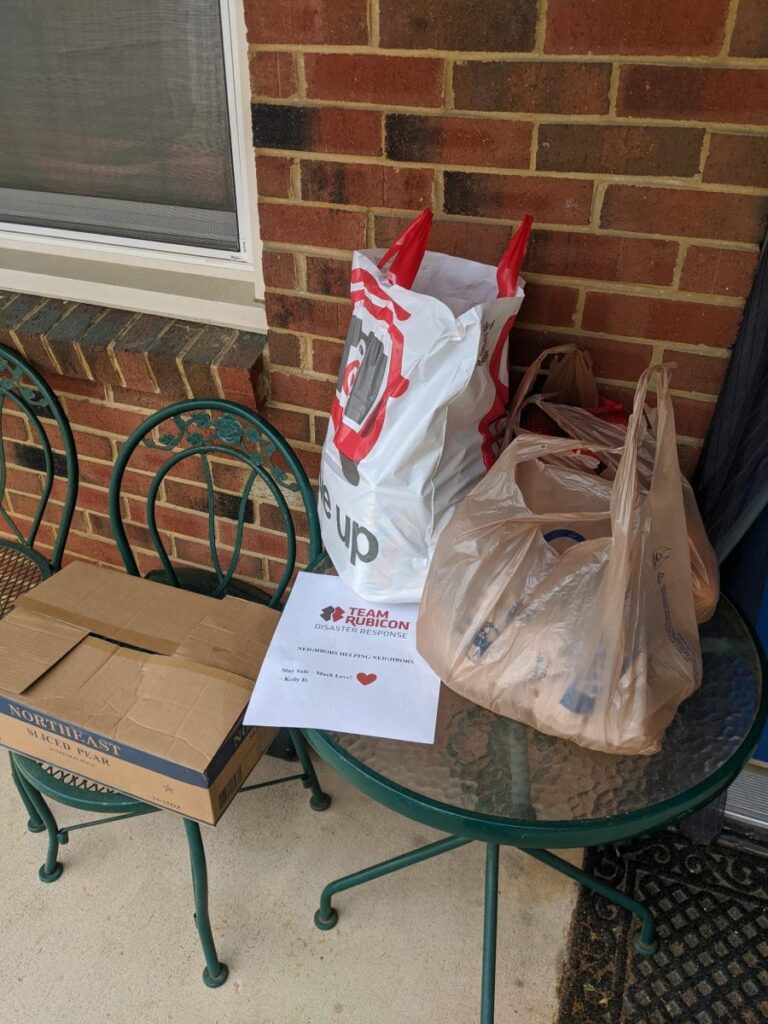Linda Smith could just cry. Actually, Linda Smith, did cry. All over the cases of water—not spilled milk—recently delivered to her front door by a Team Rubicon Greyshirt.
“When you’re alone and you’re sick and somebody just offers to do any little thing it’s just such a blessing,” says Smith. “And that was such a blessing. I wrote him and told him I cried all afternoon because I am alone up here, you know?”
Smith was one of the first people to apply for Team Rubicon’s emergency food assistance program (EFAP), a partnership between Team Rubicon and the Patient Advocate Foundation (PAF), and sponsored by Bristol Myers Squibb Foundation. The food assistance program works by connecting people with cancer, multiple sclerosis and rheumatoid arthritis with grants from PAF and Bristol Myers Squibb, and food deliveries by Team Rubicon volunteers.
Smith first discovered the emergency food assistance program in May through the multiple myeloma society. She had been diagnosed with the disease nearly two years earlier, while visiting Tallahassee for a football game. She liked her doctor so much that she moved north for treatment—and hasn’t left. Clearly, she has no trouble stepping out of her comfort zone. Still, being new to the city means she’s also sheltering in place and fighting cancer without a solid support network. Going out for her own groceries during the coronavirus pandemic not only elevates her risk, but can be difficult, especially when some of those groceries include cases of water.
Enter Keith Luce, a lieutenant with the Leon County Sheriff’s Office, a U.S. Army veteran, and a very zealous Team Rubicon Greyshirt.
“Keith called me, and he said, ‘we are the local people, and what can I do for you today?’,” says Smith. “And I was like, ‘Oh, God, thank you!’ And then I tried to talk him out of helping me!”
Luckily, Luce persisted in his attempts to help.

A Team Rubicon volunteer delivers food in San Diego.
“I just kept talking to her—because I can’t not, I like to talk to people. I tried to build some rapport with her, and come to find out she had no family in Tallahassee. She has one friend. But she was like ‘you know I’m doing fine I’ll make it,’” says Luce.
Still, Luce persisted. Did she have any food, he asked? Well, things were getting low, she admitted, but she’d be fine. And so, Luce pushed a little more, until he finally got Smith to confess that she needed a bit of juice and two 24-packs of water—a lot to carry, especially for a woman with multiple myeloma. Before Luce called, she’d taken to bringing the water in six bottles at a time.
With confession in hand, Luce insisted Smith write out a grocery list, which he stopped by to fetch from her along with a check for the groceries—and $8 which Smith insisted he take in case the store wouldn’t accept the check. Within hours, Luce had returned with the cases of water, and groceries to boot. He left with Smith’s gratitude, and a promise that she’d call if she needed anything else from him.
“I’m telling you, I appreciate Keith, and I don’t know what made him reach out to me, but I’m so thankful that he did that day. He brought me two 24-packs of water. I’m going to have to pick that up. The next time I need some water, I’m just going to call him and ask him if he could do that for me.”
Tech Play: Using Geocoordinates to Map Emergency Food Requests and Volunteers
Team Rubicon’s EFAP works by connecting people battling cancer, multiple sclerosis, and more to PAF’s grant application, then by pairing veteran and civilian volunteers with the applicant to get an emergency food delivery straight to that person’s door.
Luce admits to dogging the Team Rubicon “roll call” system, checking in daily looking for opportunities to serve. Typically, Roll Call is filled with opportunities to deploy on disaster relief operations, such as in response to tornadoes in Louisiana, but during the coronavirus, Team Rubicon began using Roll Call to connect Greyshirts with the neighbors in need and, with the new EFAP, especially to immunocompromised people such as Smith. By mid-June, Luce himself had made several emergency food deliveries through Team Rubicon.

Making an emergency food delivery in Florida.
EFAP works based on geocoordinates and some good software. When an individual submits a request for food assistance, the database assesses the person’s location by latitude and longitude, then adds the general vicinity as a new request on a map that every Greyshirt within 50 miles can see. When a Greyshirt logs into Roll Call, their map will show all the open requests for food assistance nearby, which they can then claim. Once a volunteer claims an assignment, they reach out to the patient to further identify their needs and to arrange the food delivery—or, cases of water as it may be—right to the patient’s doorstep. Those with the means to pay for their own groceries can do so electronically, through their grocery store, or with cash. For those in need of immediate assistance and without the resources until they receive their grant, Greyshirts will pick food up from local food pantries instead.
An Emergency Food Delivery Gets Personal
Luce isn’t the only civil servant Greyshirt snatching up emergency food delivery assignments. In Chicago, fireman Tony Franssens has not only been assisting with Team Rubicon’s food and PPE distribution program at the United Center, but has also delivered emergency food and supplies to eight people through EFAP, although he has connected with more than two dozen, many who didn’t need an emergency food delivery but had applied for the grant. First, Franssens says, he nabs the assignments closest to his home. But then, he also takes on many of the food delivery assignments in southwest Chicago, where he worries there may be fewer Greyshirts, and where, thanks in having been born and raised in Chicago and due in part to his work as a fireman, he also knows his way around.
Franssens admits he doesn’t just drop off food, he does a lot of listening, too. There was the house where he went to deliver food for one man, and discovered his equally sick brother was living there, also. So, he returned a few days later with a second delivery, just in case there wasn’t enough food for both of theme.
And, there was Wilmena, a woman going through chemo to whom he recently delivered a package of groceries.
“She’s by herself, which is most of the clients that I run into. She was just overwhelmed because she says it seems like anytime somebody does for somebody, there’s always an agenda,” says Franssens. If he has an agenda, is probably just to be an ear, although perhaps also to get a compliment on his freshly-buzzed head. At the end of the visit, and after a solemn conversation about her medical condition, Wilmena asked Franssens if they could pray. The Greyshirt firefighter agreed, took off his cap, and bowed his head, leading Wilmena to exclaim, “Oh! You’ve got no hair on your head, just like me.”
Franssens knows that each of his emergency food deliveries are just supposed to be a one-time thing, but like just about every Greyshirt who is volunteering their time to the emergency food assistance program, he tells the people he meets that if they need another run for food or supplies to just let Team Rubicon know. Franssen is constantly on watch for any requests that pop up in the neighborhood, after all.
Cancer Patient Wants to Pay it Back
Not every Greyshirt and EFAP client interact so directly. Virginia Beach single mom and Greyshirt Kelly Devine has been picking up supplies from food banks, repackaging them and including a note from Team Rubicon, and leaving the food on her assignee’s doorsteps.
Elsewhere, Team Rubicon’s client navigators have been stepping in to help. When a request for food assistance is logged in the system in an area with few Greyshirts, client navigators pay attention.
“If the client is a senior living in a remote area, often a remote assist will entail referring them to Meals on Wheels, or the Commodity Box program in their area,” explains navigator Byron Roos-Collins. “I call churches in rural areas every day to see if they can make deliveries of food to homebound individuals.”

One of Greyshirt Kelly Devine’s EFAP deliveries.
He’ll also steps in anytime he sees a request for assistance go unclaimed for too long. The solution he finds may or may not involve Team Rubicon at all.
“It is worth noting that these clients have indicated a critical need for food. That is why I am often trying to get them same-day food/next day food. I will take the most guaranteed, most expedient road every time,” says Roos-Collins.
Take, for example, Roos-Collins’s work with Reginald Pelt, a classically-trained French sous chef who works at a grill in North Carolina who was recently diagnosed with an incredibly rare form of cancer. When there weren’t any Greyshirts nearby to help make sure Pelt stayed home and safe and also got food, Roos-Collins found a pastor from Fayetteville and asked for advice. He thought he might connect Pelt with a food bank that could make an emergency food delivery. Instead, the pastor stepped up and has been delivering food to the chef himself.
Pelt himself was shocked. Not only would he receive food assistance immediately, he also qualified for the $500 grant to help with his future food needs.
“I was just so excited because, you know, the food was what I was looking for. But then they came along and just blessed me with the $500,” says Pelt. “Man, I tell you right now as we speak we’re trying to put together a fundraiser so I can start giving back.”
His first plan? When he’s strong enough, to open a food truck where he can cook again, and give a portion of the proceeds to organizations like Team Rubicon in order to return the favor.
Even if the coronavirus pandemic comes to an end soon, Team Rubicon, the Patient Advocate Foundation and Bristol Myers Squibb Foundation don’t see any end in sight for the emergency food assistance program. Already, more than 503 requests for food pick-up and delivery have been completed, and more opportunities to serve immunocompromised Americans wait in the wings. All this from a program that is barely one month old.



